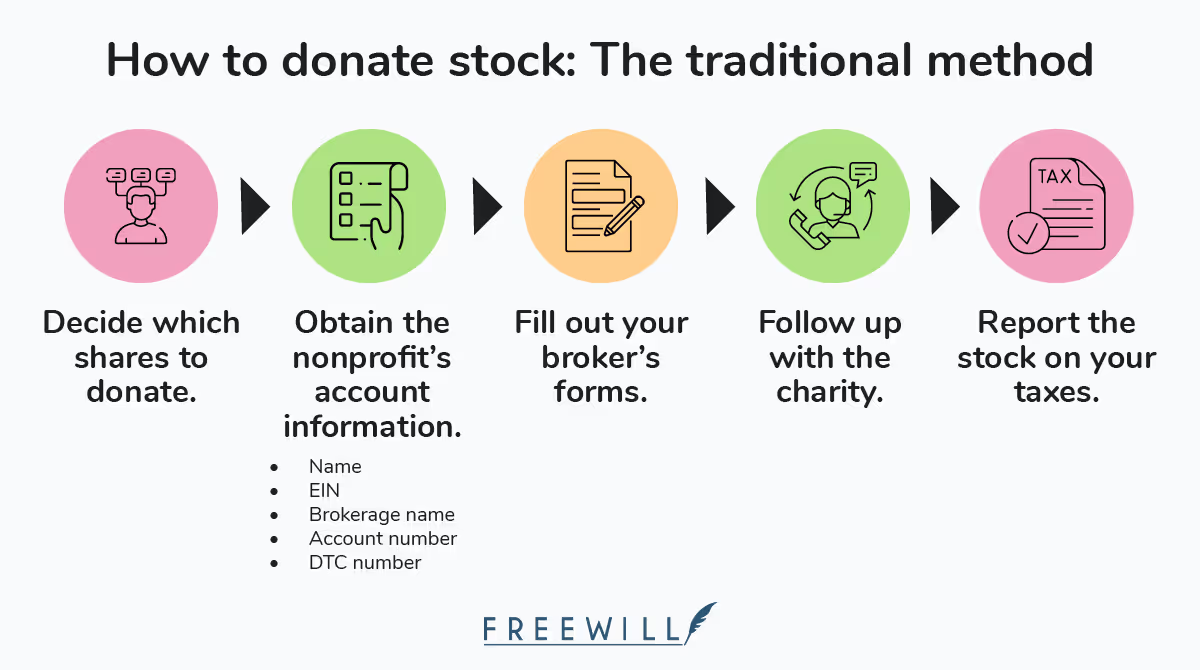If you’re among the Americans who donated a total of over $557 billion to charity in 2023, you’re probably familiar with cash giving. Donating with cash, check, or card is one of the most common ways to give to the causes you care about.
What you may not know is that there are tons of other ways you can donate to your favorite nonprofits — and donating stock is one of the smartest ways to give.
If you own stock and regularly donate to nonprofits, you might have a few questions. What are the benefits of this kind of gift? How does it work? Let’s take a look.
Why is donating stock to charity better than cash?
There are several great reasons to donate stock — for starters, it’s one of the most tax-savvy ways to give. Not to mention, today’s online platforms make it an incredibly easy and secure process.
You can donate these types of securities to nonprofits:
- Publicly-traded stocks
- Privately-held stocks (which will require independent appraisals beforehand)
- Shares of mutual funds and ETFs
- Bonds
No matter which type of appreciated stock you donate, your gift goes further than if you sold it and donated the proceeds as cash.
This is because donating appreciated stock lets you save on your taxes in two ways: you avoid capital gains tax on the appreciated value, and you can also claim a tax deduction on the value of the shares you donated.
Understanding the tax implications of stock donations
Let’s take a closer look at how the tax benefits of stock donations work.
A capital gains tax is the tax you have to pay on the profit generated when you sell a share of appreciated stock. Depending on your income bracket, you could be taxed up to 20% on your capital gains (for assets you’ve held for more than a year). However, if you donate this stock to a charity instead of selling it, neither you nor the charity have to pay taxes on it.
For example, let's say you purchased a share of stock for $100, and it rose in value to $300 over two years. You’ve generated a capital gain of $200. When you sell that share, you’d have to pay a capital gains tax of up to $40, reducing the final value that you receive from the sale. But by directly donating the stock, the money you would have paid in taxes can instead go to the nonprofit, maximizing your philanthropic impact.
And like most charitable donations, stock donations are deductible from your income taxes. When you file your federal taxes, you can deduct the donation from your taxable income if you itemize your deductions. Some states give income tax deductions for stock, as well.
Giving stock to nonprofits also exempts you from the wash-sale rule, which prohibits investors from selling and then immediately repurchasing stock from a company. When you donate stock, you can immediately repurchase the same stock at its fair market value, which will reset your shares at a higher cost basis and maintain the composition of your portfolio.
Donating stock is a win-win, both for you and for the causes that matter to you.
So how exactly do you do it? Let’s take a look at two methods — the modern way and the traditional way.
How to donate stock to charity: The modern way
Online tools today make it incredibly easy to donate stock to nonprofits. While the traditional donation method (described below) requires several follow-up steps to coordinate the gift between the brokerage that manages your assets and the charity, FreeWill’s free stock giving platform allows you to initiate a stock transfer in just ten minutes or less.
Here's how it works:

- Gather your stock information and complete your forms.
- You’ll need to know the name of the stock, its ticker symbol (for publicly-traded stocks), the number of shares to be donated, and the intended date of the transfer.
- The FreeWill platform will automatically find and populate your brokerage’s forms with your information.
- If your chosen nonprofit is registered with FreeWill, its account information will also automatically populate.
- Send the forms to your brokerage.
- We’ll provide the contact information for your brokerage. Simply forward your forms to begin the stock transfer process.
- We’ll also notify the nonprofit of your gift so that they can prepare to send you a tax receipt and message of thanks.
Once the gift has been processed and acknowledged by the nonprofit, simply report it the next time you file your taxes.
By eliminating unnecessary back-and-forth steps between you, your brokerage, and the charity, we make the process as fast as possible — a quicker, bigger impact for your favorite cause with no hassle for you.
How to donate stock to charity: The traditional way
To manually donate stock to charity, you’ll fill out a stock transfer form from your brokerage. On the form, you’ll list information about the stock you want to donate and which charity you want to donate to.
Even if you take the shorter route with FreeWill, it can still be helpful to understand all the information and behind-the-scenes coordination that goes into the process. Let’s break down each step:

1. Decide which shares of stock you want to donate.
First, you’ll need to decide which shares you want to donate, and to which organization. You’ll need the name of the stock, its ticker symbol (if publicly traded), the number of shares to be donated, and the intended transfer date.
2. Obtain your nonprofit’s account information.
Reach out to your preferred nonprofit to get their transfer information and brokerage numbers. To make a stock donation, you’ll need to have the organization’s:
- Full name
- EIN (Employer Identification Number), which is a unique number issued by the IRS to a business entity. You can find a charity’s EIN by doing a quick internet search or checking the IRS’s Tax Exempt Organization Search database. If a charity has multiple chapters, each chapter will likely have its own EIN.
- Name of the charity’s brokerage firm (the receiving institution)
- The nonprofit’s account number with its brokerage
- The nonprofit’s DTC (Depository Trust Company) number
3. Fill out the appropriate stock donation forms and send them to your brokerage.
Your own stock brokerage firm will be responsible for transferring your shares to the charity. You can usually find stock donation forms in your online account portal on your brokerage’s website.
If electronic forms aren’t available, you should fill out printed forms in black ink pen, adding all the information from Steps One and Two. Mail or fax your transfer request to your brokerage’s address, which should be listed on your forms. If you receive a confirmation number, keep it for your records.
To be eligible to receive a tax deduction for the current tax year, you need to complete your stock donation by December 31. Keep in mind that a stock donation is recorded on the day it’s received by the charity, not the day you submit the transfer request. The end-of-year period is especially busy for stock brokerages and charities, so it’s a good idea to plan ahead.
4. Follow up with the charity to make sure the donation is received.
Be sure to notify your charity of your stock gift so they know to expect it. One pitfall of this traditional process is that brokerages often report donations of stock anonymously, meaning the nonprofit might not know who sent them the gift.
Later, follow up with the charity to make sure they receive your stock donation. Once the transaction goes through, your charity should send you a tax receipt that lists the date of transfer, the value of the donation, the number of shares, and the stock’s ticker name.
Check this receipt to make sure your donated stock was liquidated for an accurate fair market value, and keep it for your records for when you next file taxes.
5. Report the stock donation when you file your taxes.
When you file your federal taxes, you must report your stock donation on IRS Form 8283, which is the form for non-cash charitable contributions. You’ll file this form with your tax return for the year you donated the stock.
Why is the modern stock donation process more helpful for nonprofits?
While all forms of donor support are valuable, some methods are easier for organizations to manage than others.
Remember that brokerages often report stock transactions to nonprofits anonymously, even if that wasn't your intention. Without your name or contact information, there's no way for a nonprofit to thank you or show you the impact of your gift over time. It can also be a security risk for nonprofits to publicly share their account and DTC information.
Tools like FreeWill are a win-win for both you and your favorite nonprofit — making it easy for you to give, and easy for your chosen charity to receive your gift and immediately put it to use.
By aligning charitable giving with estate and tax planning, you can maximize the benefits to both you and the nonprofit while securing your financial legacy.
Why giving stock to a church is especially savvy
In 2023, religious charities received $145.81 billion in contributions — that’s 26% percent of all charitable giving that year. These numbers are too high to just consist of a few dollars in the offerings plate every Sunday!
Statistically, chances are high that you already (or might one day decide to) give to a religious organization. We wanted to mention the benefits of stock giving for these organizations specifically since they’re such a prominent fixture in the philanthropic landscape.
Stock donations have tremendous value for churches, synagogues, mosques, temples, and other houses of worship. In fact, it is almost always better to donate appreciated stock, ETFs, or mutual funds than it is to donate cash.
Why? Because it means that your church or house of worship can receive the entire gift. It also allows you to avoid capital gains tax.
Here’s an example:
- Let’s say you own appreciated stock worth $27,400.
- If you sell it, you may pay $7,400 in capital gains tax, leaving you with $20,000 to give to your church as a tax donation.
- Instead, you can donate the stock directly to your church. The church then receives the full $27,400 value — and you write the full $27,400 value off on your taxes, too!
That extra $7,400 can make a massive difference. No matter the size of your donation, avoiding capital gains taxes provides a built-in boost. So if you decide to make a sizable end-of-year contribution, this difference (often around 20% or more) can transform the church’s programming, maintenance, outreach, and community events for the coming year.
Just changing the way you donate could pay your church’s expenses for a full month!
A few key considerations to keep in mind:
- Remember that donating appreciated securities also allows you to reevaluate and rebalance your investment portfolio. Learn more about ways to reduce or avoid capital gains taxes while managing your investments.
- If you decide to donate stock to a religious organization, let them know beforehand. The organization may have specific procedures for receiving stocks.
- If you’re considering donating a losing stock to charity, the better option would be to sell it and then give the funds directly to your church. This way, you can take a capital loss deduction, and the church receives the same amount either way.
- Always itemize your deduction come tax season. Only itemized deductions can be deducted from your taxes, and you must have a record of the donation. (If you donate stock through FreeWill, this is easy — we’ll send you a receipt immediately after liquidating your stocks.)
For the easiest stock giving process, check to see if your chosen organization is available on FreeWill’s stock giving platform. We streamline the whole process for you and ensure your church receives your gift as quickly as possible.
Simplify your stock giving with FreeWill
Donating stock is one of the most tax-savvy ways to give to nonprofits.
And it’s growing in popularity, too. Fidelity Charitable found that two-thirds of all contributions made by clients in 2021 came from non-cash assets like stocks. Gifts of non-publicly traded assets have also grown significantly as donors look for new ways to tap into tax benefits while making a difference for charitable missions.
By using FreeWill’s stock donation platform, it’s easier than ever to make a lasting impact on the causes that matter to you. Start your stock gift today or learn more with these additional resources:
Make your free estate plan today

Make your free advance healthcare directive

Make your free durable power of attorney

Make a stock donation today

Make your free revocable living trust










